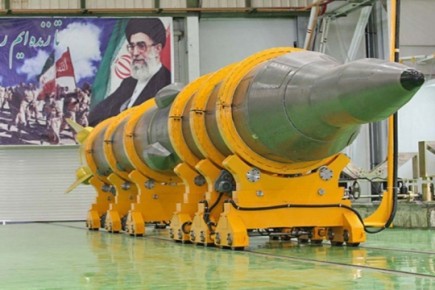U.S. State Dept: We can’t deny Iran nuclear cooperation with North Korea – “It won’t stop nuke deal”
 The State Department won’t deny that Iran is cooperating with North Korea on its nuclear program, and said during the press conference Thursday that even if the two nations are cooperating it would not hinder a nuclear deal between the U.S. and Iran.
The State Department won’t deny that Iran is cooperating with North Korea on its nuclear program, and said during the press conference Thursday that even if the two nations are cooperating it would not hinder a nuclear deal between the U.S. and Iran.
Associated Press reporter Matt Lee asked: “Have you seen this new report from the Iranian opposition about Iran-North Korea nuclear cooperation?”
“We have seen these claims, and we take any such reports seriously,” said State Dept. spokesperson Jeff Rathke. “… We’re examining the report, but we don’t have any information at this time that would lead us to believe that these allegations impact our ongoing negotiations over Iran’s nuclear program.”
“If the allegations are correct, how could that not impact negotiations?” asked an incredulous Lee.
“Well, again, these allegations, we’re taking them seriously, we’re examining them. I don’t have a stamp to put on them and say whether we’re able to verify them,” said Rathke. “We have not been able to verify them thus far. We’re examining the report.”
“But this isn’t the first time there’s been allegations … others have also said that there is a significant amount of cooperation between the two,” chimed in another reporter. “[A]re you saying that you have no reason to to believe there’s such cooperation, or that these particular allegations are unfounded?”
“Well, I’m not saying that they’re unfounded,” responded Rathke. “I’m just saying we don’t have — we’re examining these allegations. They’re serious. I’m not able to verify them.”
The reporter then asked, if the State Department doesn’t know whether the allegations are true, how do they know it won’t impact the negotiations. “If they’re true, feasibly that would impact your negotiations?” she said.
Rathke’s responded: “Well, based by the information we have at this time, is the way I would put it—”
Rathke also said he won’t speak to whether the allegations will come up at the negotiation table.
Lee cut in, “Let’s put it this way: cutting off Iran’s pathways to a nuclear weapon is a subject that comes up in the negotiations, is it not? So is sanctions relief, is it not?”
Rathke replied affirmatively to both questions.
“Okay, so you’ve just said two things that are involved in negotiations,” said Lee. “You’ve also said that on the sidelines of the negotiations the fate of the status of Americans being held or missing comes up. Why can’t you say whether allegations of Iranian cooperation … with North Korea would come up as part of the negotiations?”
Rathke answered by reading a prepared statement: “With respect to North Korea, we continue to work with the international community to exercise vigilance over their proliferation activities worldwide. This is the subject of numerous U.N. Security Council resolutions. … There’s, of course, a very elaborate international framework …”
Rathke then tried to address the question: “Any cooperation with Iran on proliferation [of] sensitive nuclear or ballistic missile activities would also violate relevant U.N. Security Council resolutions … So you’ve got U.N. Security Council resolutions that apply to Iran and to North Korea. We follow these extremely closely but I don’t have more to say on the specific allegations which we are examining.”
“Okay, but if it’s a violation — and we’ll take it quite apart from the sanctions on North Korea — you are not negotiating with North Korea at the moment,” responded Lee. “You have, but you’re not now. You are negotiating with Iran.”
Lee continued: “Iran is in violation of numerous U.N. Security Council resolutions, dating back years and years and years. Still, even though they’re complying with the JPOA … Is bringing Iran into compliance with all relevant Security Council resolutions, is that not a goal of the negotiations here?”
“Well the nuclear talks are focused on the nuclear related issues,” said Rathke. “There are other Security Council resolutions that also apply to Iran and those continue and they will not be effected by it.”
“So, as part of these negotiations, you could reach an agreement with the Iranians … without them addressing the nuclear cooperation with North Korea? …” asked Lee.
“Again, we are focused on shutting down the pathways to a nuclear weapon. I’m not going to get into the details,” said Rathke, saying the U.S. wouldn’t “preview” whether it would address the allegations in the negotiation room.
“Why wouldn’t you raise the allegations in the negotiating room, since one means to ascertain whether or not the Iranians have had any nuclear cooperation with the North Koreans would be to ask them?” asked another reporter.
“Well I’m not ruling it in or out,” said an evasive Rathke.
“How could you not raise it? I mean if you’re trying to figure out if they’re doing it, how do you not ask them?” responded the incredulous reporter.
“We have a variety of ways of trying to verify allegations, especially serious ones,” said Rathke. “I don’t have more to say on this than that.”
“It’s my understanding … this administration, previous administrations have expressed concern, and have talked about intelligence suggesting that there is cooperation between Iran and North Korea on ballistic missiles,” said Lee. “… Is it still correct that the administration believes that there’s ballistic missile cooperation but not necessarily nuclear cooperation between the two?”
Avoiding the question entirely, Rathke said: “[W]e take any allegations of cooperation seriously.”

A nuclear Iran is cause for preemptive strikes to prevent another holocaust of civilization.